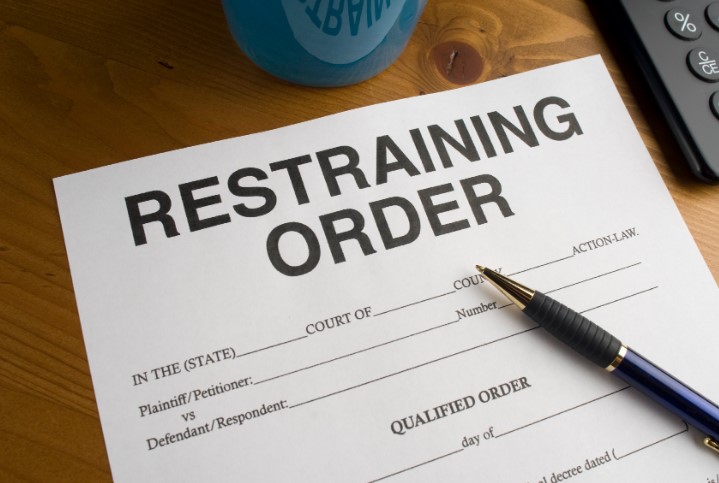How to financially survive a divorce

This is an audio transcript of the Money Clinic podcast episode: ‘How to financially survive a divorce’
[MUSIC PLAYING]
Tina
It was very financially draining, emotionally draining, mentally draining on all parties. And I would like to say that it broke me completely, and it probably felt that way for a short period of time. But I think I’ve grew to be a stronger person because of it.
Claer Barrett
That’s Tina. She’s 54, has two children in their late teens, and over the past couple of years, she has gone through something that has changed her life in many ways and cost her a lot of money: divorce.
Tina
Approximately £40,000 each, approximately. And then they did give us an annual bill at the end of each year. It was (inaudible) about 20,000 each year.
[MUSIC PLAYING]
Claer Barrett
Welcome to Money Clinic, the weekly podcast from the Financial Times about personal finance and investing. I’m Claer Barrett, the FT’s consumer editor.
[MUSIC PLAYING]
In today’s episode, divorce inquiries tend to peak in the first few months of a new year. So we thought we’d pull together some advice for anyone out there about to take this painful step, because separating from someone who you are legally tied to and might share a property with is not easy. As you heard, it cost Tina tens of thousands of pounds. So is that usual? And how on earth did it add up to all of that anyway? Well, here in the studio with me is divorce lawyer Brett Frankle from the law firm Withers. Hi, Brett.
Brett Frankle
Hi.
Claer Barrett
And joining us on the line is financial planner Tamsin Caine, who runs a firm in Manchester called Smart Divorce. Hello to you.
Tamsin Caine
Hi, Claer.
Claer Barrett
Well, I’ll be mining Tamsin and Brett’s experiences about separating the financial from the emotional when it comes to negotiating a divorce settlement. We’ll also cover the cost of divorce in terms of the legal fees and how to keep a lid on them, adjusting to supporting yourself as a single person, and how to navigate that process of deciding who gets what and how much with your ex-partner as painlessly as possible. In this episode we’ll also be covering how to go about separating pensions, when to move out of the family home, and when is the right time to pick up the phone and get professional advice. We’ll be hearing from a couple of Money Clinic listeners about their experiences of divorce and some of the difficulties they faced during the process.
But first, back to Tina. As you heard, she spent £40,000 over two years of divorce proceedings and her divorce finally came through in February of last year. She told our producer Persis Love how it happened.
Tina
We were unable to communicate right from the early days, unfortunately. We did consider using a mediator, but that was a difficult process. We couldn’t come to an agreement on that. So in the end, it was only communication via each of the solicitors and because of that, it just meant that everything was done on the legal side rather than face to face.
Persis Love
So when you say legal fees, is that kind of consultations? What does that consist of? What was that money going towards?
Tina
The idea was that that was for letters. It was for emails. I mean, I think they charged £20 for an email going one way and £20 for a response. But send, you know, send half a dozen emails and half of them as responses and you’ve already got a substantial amount added to your monthly bill. There was all sorts of bits and bobs that they had to do. Any telephone matters, anything to do with the properties, to do with the vehicles that we both had in our possession, to do with pensions. There was just so many things that, you know, when added up, that’s why it was totalling over £1,000 a month.
Persis Love
And when you were in that situation, was there any alternative given? You know, any way of being like this divorce can go through and, but there is this much cheaper way of doing it?
Tina
No, basically, if I couldn’t afford to pay, then the suggestion was that I’d have to go ahead without legal representation. But as far as they were concerned, they knew that I could afford it. So even though I personally felt it was such a struggle, they didn’t ever see it as a struggle because of what money they knew I would be entitled to and what money I already had in savings.
Persis Love
And when you first reached out to the solicitors, did you have any idea how much it was all gonna add up to?
Tina
When I initially spoke to them, the quote that they gave me was a fixed sum of £500. Obviously, I’ve never been divorced before. I wasn’t sure how long the process was going to take, and I presumed that we would go have this meeting, we’d come out and with, I dunno, everything would be lovely, we’d agree to separate and they’d go, there’s your bill, £500 on there. You get 50-50 of everything. I just think it would have been easier then to give me an idea that the figure was a £500, say, starting block, but most divorces with pensions or private businesses or any other matters like that could reach as much as £40,000.
[MUSIC PLAYING]
Claer Barrett
Well, that was Tina there telling us about the experiences of her divorce. And she says, you only really find out about this when it happens to you. It’s not something we would wish to experience twice in our lives. But Tamsin, as a financial planner who works with people who are going through a divorce, I mean, these kinds of fees, is £40,000 a common amount to spend on a divorce?
Tamsin Caine
Probably, yes. It’s absolutely heartbreaking listening to Tina, isn’t it? And yeah, the fees can certainly rack up. And 40,000, um, actually isn’t that unusual, unfortunately.
Claer Barrett
Gosh. And Brett, as a divorce lawyer, what did you make of Tina’s situation? You looked a bit uncomfortable listening to some of the things she had to say.
Brett Frankle
I did. And I do feel slightly uncomfortable listening to it because the one thing that clients should feel is that they have an understanding of the process and the costs that are likely to be incurred. And to be told £500 without being told what the various options would be, the potential costs could be, I think is disappointing to hear from the profession. But it’s important that people bear in mind that at the very outset it isn’t always possible to give fixed views or fixed cost estimates because circumstances change.
Claer Barrett
Could you walk me through the divorce process and the different costs that rack up at different stages? Now, Tina mentioned getting a mediator at the beginning, which would have avoided the need, as you say, for an acrimonious battle between solicitors. It wasn’t something that they went through with in the end. But Brett, would you say that’s the first step that somebody who’s considering a divorce should take?
Brett Frankle
So the divorce itself is a very simple exercise that’s dealt with online these days. It costs £593. You tick a box, say you would like a divorce, and you don’t have to give a reason for why you would like that. The divorce is usually very straightforward. It’s the division of the assets that is what causes costs sometimes to be incurred. There’s an obligation on parties to consider mediation these days before they commence any legal proceedings. A mediation or some other form of amicable resolution is often the way that cases are resolved.
Claer Barrett
And Tamsin, could you just tell us a little bit about how mediation works with the kind of clients that you’re advising on a daily basis?
Tamsin Caine
Yeah, absolutely. In terms of mediation, it can be used for resolving financial issues. It can be used for resolving issues around the children. And I think in certainly in the instance where I’m often working with clients who are going through mediation, I might be brought in as what’s called a financial neutral.
Claer Barrett
Mm-hmm.
Tamsin Caine
So that would be where I joined the mediation and worked to provide information to both parties so that they’re both getting the same information. Another way that I work with clients in mediation is where there is perhaps a, I’m gonna call it a power imbalance. So where one party is financially much more used to dealing with money and perhaps more financially educated or just financially capable than the other, which makes negotiations very difficult and can be very imbalanced. So I might work with the less financially educated party to bring them up so that they feel confident to enter the negotiations and provide their side of the argument without being overpowered.
Claer Barrett
Now, if you’re in a situation as many, many couples who are divorcing are at the moment when money is tight, we’re in the grip of a cost of living crisis and you worry that you don’t have the money to cover the legal costs of getting divorce and all that entails. What can you do then, Brett?
Brett Frankle
Well, you don’t have to have a lawyer. And you can also choose to use a lawyer in the way you wish to. It’s very common for people to have lawyers in the background to ask questions of as when needed. There’s also, it’s true to say that lots of cases never see lawyers. Lots of people are able to resolve their matters between themselves. And there are some fantastic websites that give people information — the Resolution website, the Family Justice Council guidance, all are online for free, gives lots of people lots of details about how you go about getting a divorce. There’s also some fantastic charities that provide help and citizens’ advice as well.
Claer Barrett
Wow, we will put links to all of those in the show notes for today’s episode. But now let’s hear from another Money Clinic listener who’s going by the name of Jane. She has an American accent, but her and her ex live in the UK, so they got divorced under the UK family law. She also spoke to our producer, Persis Love, and as was the case for Tina, Jane found that divorce proceedings were far more complicated than she’d anticipated.
Jane
What we learned was that divorce is comprised of three things. The first is your legal status, your, you apply to get divorced, then you’re legally divorced. But separately, if you have children, the parties have to come to some sort of agreement about how to care for the children. And then the other area, which is really prickly, was coming to some agreement as to our financial split. And that’s where all of our difficulties have come about. And that’s been really acrimonious and slow-going and expensive. It takes such a long time.
Persis Love
And what were the assets that were actually being disputed in the financial order? What were you dividing up?
Jane
For me, it was quite simple because the focus was on the equity in the house and our pensions. So the pensions were imbalanced considerably in my ex’s favour because I had a massive career hit while my three children were very young. So I had started out saying, “Look, I think I need a little bit more in equity rather than 50-50 in order for me to afford something to house me the children.” And so the counter-offer was, “That’s fine. You can have a little bit more, but then I’m not sharing any of my pension with you.” And I thought, well, actually, when you look at it like that, I’m getting, like, less than 50 per cent of the total assets. That’s crazy. So we just reached a standstill with our negotiations.
Persis Love
And so while you were in this standstill, I mean, what was it like? Like, what financial situation were you in?
Jane
So in my situation, for example, my ex, he moved out. So he decided that he wasn’t going to contribute towards the joint mortgage or the utilities or the council tax in the family home because he had moved out. And I discovered, to my horror really, that there was nothing I could really do about it, because the court can’t order both parties to pay towards the joint mortgage. They wouldn’t even know what sort of contribution to order to me. But apparently this isn’t a thing, you can’t make the other side pay.
Persis Love
I mean, that sounds like you reached a real stalemate, but can you tell me what was the motivation for your ex not wanting to sign on the new mortgage?
Jane
The whole idea was it was to try to pressure me to try to settle in the financial proceedings as quickly as possible. But my view was that the settlement offer that I was given was very, very unfavourable to me. So it just didn’t make sense to do that.
Persis Love
Now, Jane, obviously you’re coming to the end of your divorce proceedings, but thinking back to a couple of years ago when you were starting out, what sort of questions would you have had back then that we should ask our experts on the podcast now?
Jane
I would probably be interested to know practical, yet important financial steps that I would need to take before I ask my partner for a divorce.
Persis Love
And anything else?
Jane
I’d be interested to know if there was any sort of way through legal procedure to require both parties to a joint mortgage to contribute towards it, either within family law or outside it. If you’re in a situation where your former partner is not co-operative because moral obligation is ineffective in that situation.
Claer Barrett
Well, we heard from Jane there about the troubles that she’s been going through, trying to separate from her partner financially. Brett, does this kind of thing sound familiar to you? Are these sorts of disputes around the family home part and parcel of your everyday work as a divorce lawyer?
Brett Frankle
To some degree, they are. Emotions . . . people using their financial advantage to their advantage are a very common occurrence.
Claer Barrett
And these sorts of disputes where one partner is saying, “Well, you can stay in the family home, but I’ve got to cover my own costs so I’m not paying the mortgage for it.” I mean, is this a fairly common thing?
Brett Frankle
One of the questions that was asked was whether there is a legal route to enforce payments. And the short answer is there is. I’m surprised that it hadn’t been raised before. The courts are very clear that you shouldn’t be placing financial pressure on your spouse at a time when you’re trying to negotiate an overall financial settlement. So there is the option for what we call interim maintenance. There’s the option for legal services provision in order to help pay for legal fees. The courts are very clear that that sort of approach is not to be tolerated. Obviously, I can’t comment on each individual case and affordability, but it is something that people should understand — that they can’t bully their spouse into doing a deal by stripping away money that’s needed.
Claer Barrett
Mm-hmm. And let’s talk a little bit about the process of coming to that financial settlement. Brett, what kind of assets go into the financial settlement? What sort of things do both parties have to disclose at the get-go?
Brett Frankle
So all assets, wherever they may be located, should be disclosed, and they all form part of the marital pot. Of course, look at the values of properties, money in the bank, pensions, values of businesses. And if there’s ever a dispute about valuation, it’s possible to get an expert to come and value those things. The courts also look at income and not just in terms of what someone’s earning, but their bonuses, any deferred compensation, tax credits. It’s all factored in, as well as looking at needs. So one of the other things that people should consider when they’re getting divorced at the very outset is what they are really looking for, not just in terms of an overall division, but what do they need in the interim, what’s their budget, how much do they need to spend on the groceries, going on holiday? In due course, what they would need for a property? And you have to do a balancing exercise when looking at the assets and looking at each party’s needs in order to achieve a fair outcome.
Claer Barrett
Mmm. And I mean, Tamsin, one of the things that you specialise in as a financial planner is helping people to forecast their financial needs and, of course, adjusting to life as a single person. And in Jane’s case, a single parent, definitely takes some doing.
Jane
Yeah, absolutely. One of the main areas of work when I’m working with the client is to pull together the information about what they have budgeted, what they believe their financial needs will be moving forward from now until, well, for the rest of their life, essentially. So that when we’re looking at needs and when we’re looking at the negotiations, we can support what we’re saying they need by showing a financial forecast of those needs. Obviously, it’s not an exact science, but I think that gives couples or certainly the individual that we’re working with that clarity about what the future looks like rather than just a series of numbers, which don’t necessarily mean anything to somebody, particularly if they haven’t been the person who’s been in charge of the money in their relationship.
Claer Barrett
Now, the sticking point with Jane’s divorce negotiations, as we’ve just heard, was the value of her partner’s pension. And as we heard, there was a reluctance to split the value of the pension if the wife was going to end up with the family home. Now, Tamsin, I know that the role of pensions in divorce is something that you are famous for highlighting on Instagram and on all of the events that you run to raise awareness. Why are pensions such a thorny issue in divorce?
Tamsin Caine
Oh, I think the main reason is that pensions are only ever in the name of an individual. So there is a tendency for people to say, “Well, it’s in my name, therefore it’s mine.” Therefore, you are not, in quotes, “getting your hands on it.” But this situation often is, you know, in family relationships where one person will be earning more with the support of the other person at home, perhaps doing more than an equal amount of looking after children of, you know, making meals, looking after the household, et cetera. And there’s no pension contribution for that. And so it has been the case certainly in the past, where I think people have kind of gone, “Oh, well, we’ll just going to keep our own pensions. We’re not going to look at them.” But I think if you go down that route, you can be giving away tens of thousands, if not hundreds of thousands of pounds that you could have been able to share and that you’re just agreeing to give it away. And certainly, the courts are making moves to stop that happening. And so hopefully we are making some moves forward. But it’s very important. They’re often the second-biggest, if not the biggest asset held in a marriage.
Claer Barrett
Now, you heard just then Persis, our producer, asking Jane what she wished she knew at the beginning of the divorce process rather than having lived through the experience and then she found out at the end. Brett, I’ll ask you first, what are the key things that you would like people to know at the beginning?
Brett Frankle
The first point is to consider the financial disclosure. Once you’ve got the financial disclosure, you can think about different options. You can think about different ways to resolve the case, but you do so knowing what the financial landscape is. And that really is the key to any divorce settlement. And it’s the most important thing when you’re looking at trying to achieve fairness. And I think at the outset, that’s the most . . . that’s the most pressing point for most people getting divorced.
Claer Barrett
And Tamsin, what would you say to people listening about what they should know at the very start of the process that unfortunately, they may only find out through experience at the bitter end?
Tamsin Caine
(laughter) I think my starting point would always be to try and take the emotion out of it first, because actually the financial settlement, it has no bearing while somebody has (inaudible) their behaviour and losses during the case. So I think that’s a really important starting point. And I think another thing to mention is that quite often, bringing in other professionals at various points, so whether it’s the divorce coach, whether it’s a financial planner, whether it’s an actuary or a pension and divorce expert, doesn’t necessarily mean in the long term that the case will cost you more, that the fees overall will be more. In effect, actually quite often, having a group or a team of divorce experts around you who play to their own strengths can mean that you resolve things earlier.
Claer Barrett
Now, you mentioned a divorce coach. I have to say, I’ve never heard of that before.
Tamsin Caine
Divorce coaches are . . . can be absolutely brilliant. So they can help you deal with the emotional side of things. But moving forward, they can help you to plan what happens in the future. They can help you have conversations with your ex or your children, and they can be a really, really valuable part of your divorce team.
Claer Barrett
Well, let’s try and end the podcast on a positive note. Give us some hope. Is there any such thing as a good divorce?
Brett Frankle
There is. And the vast majority of cases never, ever get to court. Most people are able to resolve their matters amicably. They may need advice along the way, but the key is that very often parties who’ll continue to be parents need to have a relationship with each other going forward, and there’s no point creating World War III. There’s emotion involved, of course, and there may be hiccups along the way. But ultimately, the vast majority of cases that we see, people are able to move on without the confrontation that some of the listeners have spoken about today.
Claer Barrett
And Tamsin, how would you answer that? Any such thing as a good divorce?
Tamsin Caine
Absolutely. Yeah. I would say that the majority of the clients that I work with don’t go through the court process. And if you want an example of that, I think we had a pretty good divorce when I divorced my ex. We didn’t end up in court and we managed to co-parent our children who are doing pretty well between us. So I think that’s a good news story to end on.
Claer Barrett
Well, thank you both so much for joining us in the studio today for this very sensitive Money Clinic episode, which I’m sure will be a huge help to people who are listening. And certainly if your relationship is an unhappy one, then I hope our little love-in in the studio has provided you with some hope for the future.
[MUSIC PLAYING]
That’s it for Money Clinic this week, and we hope you like what you’ve heard. If you did, then leave us a review and if you’ve got a topic that you’d like to talk to me about for a future show, then get in touch. Our email address is [email protected]. And you can follow me on Instagram, I’m @ClaerB.
[MUSIC PLAYING]
Money Clinic was produced in London by Persis Love. Our sound engineer is Breen Turner and our editor is Manuela Saragosa. And you heard original tunes this week by Metaphor Music. And finally, our usual disclaimer: the Money Clinic podcast is a general discussion around financial topics and does not constitute legal or investment advice. For that you’ll need to speak to an independent financial adviser or a good divorce lawyer. That’s all the small print for now. See you back here next week. Goodbye.







